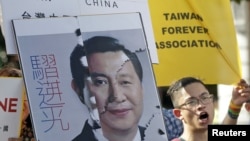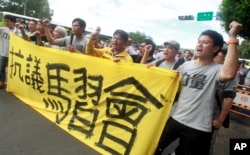President Ma Ying-jeou of Taiwan will meet his counterpart from China Saturday in the highest level meeting ever between the two old rivals. But much of Taiwan’s public has expressed confusion about the summit’s timing and fear about its outcome
Some Taiwanese worry about the meeting’s result because the announcement came too late for public debate. They also question why President Ma wants to meet his China counterpart seven months before leaving office due to term limits.
Chu Cheng-tai, a 56-year-old bystander at a small street protest in Taipei on Thursday, wonders whether the two leaders will sign a secret deal.
He said the presidential summit did not gain the approval of Taiwanese people, and that Ma is meeting Xi according to his own decision. Because of this, Chu fears, the Taiwan president might use his position to agree to something in private or make some promise. Chu is not the only one afraid Ma might sell out Taiwan.
China has seen Taiwan as part of its territory since the 1940s and threatened to take it by force, if necessary, a move that would end decades of democratic self-rule. Ma and Chinese officials shelved their political differences in 2008 to begin exchanges at lower levels of government. They have signed 23 agreements, mostly covering trade, transit links and investment.
Some Taiwanese are excited about the historical significance of the summit, which leaders from the two sides have never managed before because of icy relations. They would welcome a lifting of China's curbs on Taiwanese foreign relations or signs of lasting peace without compromising the island's autonomy.
But they wonder why President Ma did not meet with the Chinese leader when he had more time in office to follow up any goodwill. The ruling Nationalist Party is running behind the anti-China opposition candidate ahead of January elections, and that gap has sparked fear that the two presidents will try to influence voters.
Analysts say voters would veer toward the opposition candidate if they see Ma getting too close to China or if the Chinese president pressures Taiwan to move toward unification. Some activists are planning a street protest Saturday in Taipei.
Ma told a news conference Thursday he would make no deals or promises, but hoped the summit could keep ties stable. Taiwan officials say the two men will treat each other with equal respect, a touchy point as China considers the Taiwan government illegitimate and curbs its foreign relations. Ma also suggested that China-Taiwan summits become regular events.





